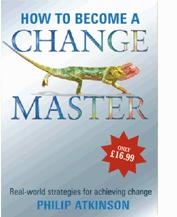How do you Create Readiness for Change
Question: How do you create readiness for change?
Answer: It constantly surprises us that many organisations do not realise they have to commit to a process of continuous self- renewal and improvement. Many do not know where to start.
For me, a good starting point is to review past change initiatives (big and small projects) and what worked and what didn’t. Identify the organisations core competencies that have enabled change to happen. It may come as no surprise that the quality of change or project managers is critical as well as identifying the key actors in the change team.
Answer: It constantly surprises us that many organisations do not realise they have to commit to a process of continuous self- renewal and improvement. Many do not know where to start.
For me, a good starting point is to review past change initiatives (big and small projects) and what worked and what didn’t. Identify the organisations core competencies that have enabled change to happen. It may come as no surprise that the quality of change or project managers is critical as well as identifying the key actors in the change team.
Question: What do you mean by the term Change Team?
Answer: There are four sets of actors in the change arena.
It is a simple matter of getting all these people to work together seamlessly.
It can be done – but can only be done once – the right way. If you have multiple attempts at the same project you lose momentum and most importantly credibility.
Answer: There are four sets of actors in the change arena.
- The change maker, facilitator or trainer
- The target of the change or change recipients
- Key stakeholders
- The sponsor, project host or senior person who owns and is responsible for the project.
It is a simple matter of getting all these people to work together seamlessly.
It can be done – but can only be done once – the right way. If you have multiple attempts at the same project you lose momentum and most importantly credibility.
Question: How can you measure readiness for change?
Answer: A quick audit would focus on how well people, teams and key constituencies have been prepared for the change or project to which you are committing. The best way to do this is using a simple tool of ‘soft due diligence’ –using Focus Groups to assess the attitude to change.
It is vital that the Focus Group sessions are well planned. You cannot just 'rock up' and run a generalised discussion with a random selection of people from the organisation.
For the methodology to work to glean valuable data, you have to adopt a core methodology that works. Prepare for the process and sell the benefits to those attending. Ensure that you manage the sessions in a sensitive manner and that feedback from their input is relayed back to the participants.
You have to focus on hierarchical levels, as well as core functions and processes, identify key players and Team members.
Be prepared to hear some bad news and prepare to deal with some cynicism and even resistance to the process.
You can train existing Team Leaders and Line Managers to support external specialists in the process, as well as bearing in mind the response to the question above about key actors in the ‘Change Arena’.
Answer: A quick audit would focus on how well people, teams and key constituencies have been prepared for the change or project to which you are committing. The best way to do this is using a simple tool of ‘soft due diligence’ –using Focus Groups to assess the attitude to change.
It is vital that the Focus Group sessions are well planned. You cannot just 'rock up' and run a generalised discussion with a random selection of people from the organisation.
For the methodology to work to glean valuable data, you have to adopt a core methodology that works. Prepare for the process and sell the benefits to those attending. Ensure that you manage the sessions in a sensitive manner and that feedback from their input is relayed back to the participants.
You have to focus on hierarchical levels, as well as core functions and processes, identify key players and Team members.
Be prepared to hear some bad news and prepare to deal with some cynicism and even resistance to the process.
You can train existing Team Leaders and Line Managers to support external specialists in the process, as well as bearing in mind the response to the question above about key actors in the ‘Change Arena’.
Question: How do you communicate the need to change?
Answer: Most organisations over-communicate the trivial and under-communicate the vital. Some organisations think that communicating once is enough and fail to test how well the communication and intent has been received.
We often find that what has been ‘sent’ is not what has been ‘received’. Reception and Acceptance are two very different elements.
We also find that a Communications Strategy is key to any change initiative, and that needs to be the first port of call.
Please don’t focus on transferring or allocating this role onto the External Relations Specialist, PR or Communications Officer. Their job is to communicate with the media or specialist interest groups usually about technical, governance or administrative issues.
‘Communication Strategy’ is far to important to be left to people who have the term ‘Communications’ in their role and job Description.
Answer: Most organisations over-communicate the trivial and under-communicate the vital. Some organisations think that communicating once is enough and fail to test how well the communication and intent has been received.
We often find that what has been ‘sent’ is not what has been ‘received’. Reception and Acceptance are two very different elements.
We also find that a Communications Strategy is key to any change initiative, and that needs to be the first port of call.
Please don’t focus on transferring or allocating this role onto the External Relations Specialist, PR or Communications Officer. Their job is to communicate with the media or specialist interest groups usually about technical, governance or administrative issues.
‘Communication Strategy’ is far to important to be left to people who have the term ‘Communications’ in their role and job Description.
Email your questions to Philip

